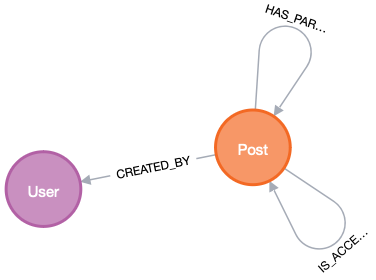Experiments on loading parquet files
JDK 17 is required. Ignore the tons of warnings, it's an experiment
mvn -Dfast clean packagejava -jar target/neo4j-load-parquet-1.0-SNAPSHOT.jar -abolt://localhost:7687 -uneo4j -pverysecret --label=Test ~/tmp/yellow_tripdata_2023-04.parquetNOTE: Client side batches are implemented as a number of statements per transaction. The code is using explicit transactions, using a parameterized query object and relies on the combined driver and server infrastructure to tune this. Right now, buffering statements and then using a halfway decent sized transaction is the only way to do client side batching with the Neo4j Java Driver. If you one needs more, it's through Cypher.
java -jar target/neo4j-load-parquet-1.0-SNAPSHOT.jar -abolt://localhost:7687 -uneo4j -pverysecret --mode=CLIENT_SIDE_BATCHING --batch-size=100 --label=Test2 ~/tmp/yellow_tripdata_2023-04.parquetThis PoC can also be dropped into the plugin folder.
After a server restart a procedure loadParquet is available.
This procedure takes one argument that should look like a URI and tries to resolve that to a Parquet file.
The URI can be a local file with or without file:// scheme or any - by Java - supported URL. Credentials, headers etc. are not yet supported.
The stored procedure returns a map per row in the parquet file.
CALL loadParquet('https://d37ci6vzurychx.cloudfront.net/trip-data/yellow_tripdata_2023-03.parquet')
YIELD row
RETURN count(row) as numRows;Or ingest all data for further processing (Note: Downloaded Parquet files are not cached and dl will add to the processing time. Use local files for benchmarking.
CALL loadParquet('/Users/msimons/tmp/yellow_tripdata_2023-04.parquet')
YIELD row
CALL {
WITH row
CREATE (r:Ride) SET r = row
} IN TRANSACTIONS of 100000 rows;I used the gis archive from https://archive.org/details/stackexchange for the following conversion. This takes only posts with a title and an owner id into account.
# Create intermedia users
xidel -se '//row/[(@Id|@Reputation|@DisplayName)]' Users.xml | jq -r '. | @tsv' | duckdb -c "copy (select * from read_csv_auto('/dev/stdin', names=['user_id', 'user_reputation', 'user_name'])) to 'users.csv' HEADER;"
# Create intermediate posts
xidel -se '//row[string(@Title) and string(@OwnerUserId)]/[(@Id|@CreationDate|@OwnerUserId|@LastActivityDate|@Title)]' posts.xml | jq -r '. | @tsv' | duckdb -c "copy (
select id, user_id, strftime(created_at, '%Y-%m-%dT%H:%M:%S') AS created_at, strftime(last_activity_date, '%Y-%m-%dT%H:%M:%S') AS last_activity_date, title_or_excerpt
from read_csv_auto('/dev/stdin', names=['id', 'created_at', 'user_id', 'last_activity_date', 'title_or_excerpt'], quote='', escape='')
) to '/dev/stdout' HEADER;" > posts.csv
xidel -se '//row[not(string(@Title)) and string(@OwnerUserId)]/[(@Id|@CreationDate|@Body|@OwnerUserId|@LastActivityDate)]' posts.xml | jq -r '. | @tsv' | duckdb -c "copy (
select id, user_id, strftime(created_at, '%Y-%m-%dT%H:%M:%S') AS created_at, strftime(last_activity_date, '%Y-%m-%dT%H:%M:%S') AS last_activity_date, substring(title_or_excerpt, 0, 32) as title_or_excerpt
from read_csv_auto('/dev/stdin', names=['id', 'created_at', 'title_or_excerpt', 'user_id', 'last_activity_date'], quote='', escape='')
) to '/dev/stdout';" >> posts.csv
# Posts with accepted answers
xidel -se '//row[(string(@AcceptedAnswerId)) and string(@OwnerUserId)]/[(@Id|@AcceptedAnswerId)]' posts.xml | jq -r '. | @tsv' | duckdb -c "copy (
select * from read_csv_auto('/dev/stdin', names=['id', 'accepted_answer_id'])
) to '/dev/stdout' HEADER;" > accepted_answers.csv
# Parents
xidel -se '//row[(string(@ParentId)) and string(@OwnerUserId)]/[(@Id|@ParentId)]' posts.xml | jq -r '. | @tsv' | duckdb -c "copy (
select * from read_csv_auto('/dev/stdin', names=['id', 'parent_id'])
) to '/dev/stdout' HEADER;" > parents.csv
# Join them together, export to parquet
duckdb -c "COPY (
SELECT *
FROM 'posts.csv'
JOIN 'users.csv' USING (user_id)
LEFT OUTER JOIN 'accepted_answers.csv' USING (id)
LEFT OUTER JOIN 'parents.csv' USING (id)
ORDER BY ID asc
) TO 'posts.parquet'"Those can be loaded with SoLoaderApplication and will create a schema like this:
This will delete all nodes with the label TestImport and create as many as there are rows returned by the given query. All columns of the query will be turned into properties.
The example uses In-Memory DuckDB for querying the above parquet file as relational table. Yes, this is stupid, and yes, it is fun too and spares me setting up another database.
Compile as above and adapt your classpath pointing to the JDBC driver for DuckDB accordingly:
java -cp target/neo4j-load-parquet-1.0-SNAPSHOT.jar:$HOME/.m2/repository/org/duckdb/duckdb_jdbc/0.8.1/duckdb_jdbc-0.8.1.jar \
org.neo4j.parquet.loader.SQLLoaderApplication \
--label=TestFromRelational \
--jdbc-url=jdbc:duckdb: \
"SELECT * from read_parquet('https://d37ci6vzurychx.cloudfront.net/trip-data/yellow_tripdata_2023-03.parquet') LIMIT 5000"